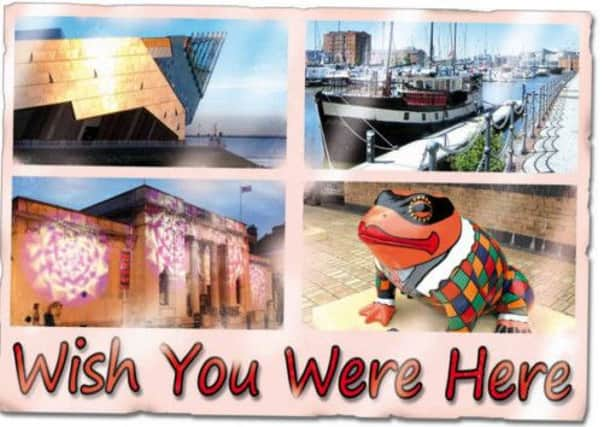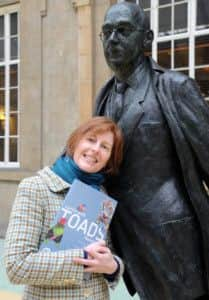Dull in Hull? It wants to be our cultural capital


PHILIP Larkin famously swerved east and made Hull his home, but for too long it’s not been somewhere people have felt the need to visit, put off perhaps by labels like “it’s dull in Hull.”
Repeat something long enough, of course, and people will start to believe it and Hull has suffered more than its fair share of bad press over the years. But times are changing and a city once regarded by many as an ailing backwater has enjoyed a cultural regeneration during the past decade.
Advertisement
Hide AdAdvertisement
Hide AdThe Deep, the world’s only submarium, and the development of the nearby marina have transformed the waterfront, while the 2009/10 Clipper Round The World Yacht Race, which started and finished in Hull, raised the city’s profile around the world.


The arts scene is flourishing, too. According to the council, last year’s annual four-day Freedom Festival generated nearly £4m for the city’s economy and attracted around 75,000 people. While the recent Leonardo da Vinci exhibition at Ferens Art Gallery pulled in huge crowds, following on from David Hockney’s Bigger Trees Near Warter, which attracted a record-breaking 63,000 visitors in 2011.
Hull has proved it can host world class events and is among those that have thrown their hat into the ring to become UK City of Culture in 2017. It is up against the likes of Plymouth, Leicester, Aberdeen and Chester, and will be hoping to turn the heads of the judging panel before the shortlist is announced in June.
It’s the second time the city has put in a bid after losing out to Londonderry for the 2013 title, but local playwright and lecturer Dave Windass sees no reason why Hull can’t come out on top. “Cities are pretty much identikit now apart from their cultural offer and when you look at the other places on the list it’s not that far fetched to think Hull could win, he says.
Advertisement
Hide AdAdvertisement
Hide Ad“It’s good to draw attention to the city in a positive sense because there’s no denying we get a bad press and there are some strange perceptions of the city. No one passes through the place, you have to deliberately make an effort to come here.”
But when people do make the effort they’re often pleasantly surprised. “We have great museums and galleries here and if you put something good on then people will support it. In the last two or three years there seems to have been an increase in artistic endeavours.”
One of the recent success stories has been the regeneration of Humber Street, the historic former home of Hull’s Fruit Market. The area had been earmarked for redevelopment but this stalled in the face of the economic slowdown and the withdrawal of public funding by the Government three years ago.
However, rather than being left empty the old warehouses have become a magnet for the local arts community. It’s home to Kingston Art Group, which provides affordable studio space for visual artists, as well as the Museum of Club Culture and Fruit Trade Music, a new recording studio and rehearsal space.
Advertisement
Hide AdAdvertisement
Hide AdIt also houses a thriving theatre community where Windass helps give new writers the chance to show their work on stage. In the past two-and-a-half years he’s worked with more than 70 writers and put on a similar number of short plays. All this has been achieved at a time when arts budgets are being heavily cut. “People here are prepared to graft and Hull’s a good place to get things going,” says Windass.
“Hull Truck Theatre is a jewel in the city’s crown, it’s our Sheffield Crucible, or West Yorkshire Playhouse, and right across the arts community there seems to be more people making and doing stuff.”
Elaine Burke, an arts consultant who has lived in the area for the past 17 years, was involved in the Larkin25 festival in 2010 commemorating the 25th anniversary of the Philip Larkin’s death. The centrepiece, which she spearheaded, was a 10 week art project that saw 40 giant toad sculptures dotted around the city to form a trail around Hull and the surrounding area.
It was criticised initially with some people questioning the wisdom of spending six figure sums on giant toad sculptures at a time when people were losing their jobs and the economy was in crisis. But Burke says the scepticism soon disappeared.
Advertisement
Hide AdAdvertisement
Hide Ad“If you came to Hull during those 10 weeks you would have seen it crowded with people running around with toad maps. There were families with kids and grandparents, teenagers, everybody bought into the idea,” she says. “It was to commemorate Philip Larkin, but it was also to create a fantastic experience and to take another look at Hull.”
She says it encouraged people to go to parts of the city they wouldn’t normally visit. “It moved people around and it got them interested in the city. The media interest was phenomenal and we worked out that there was a story on average in the local media every three days. We also got a lot of national coverage, Radio 4 came up a couple of times and Time Out did a piece. So suddenly there was this enormous sense of pride.”
Larkin with Toads also generated an estimated £1m for the Hull economy showing that successful arts events can also generate money as well as bring in the crowds. “There’s something about the arts that can reach parts that other things can’t as the Toads project proved.”
Despite such successes Hull isn’t a city people instantly associate with culture.
Advertisement
Hide AdAdvertisement
Hide Ad“I think in the past there hasn’t been enough of a cultural offer and I don’t think Hull has been great at shouting about what it has, but things like the Freedom Festival and the toads project have opened people’s eyes,” she says.
“It’s been hard for the city to make the transition from being a port and part of the fishing industry, but I think the business community realises that to attract inward investment and encourage people to come and work here, the cultural and lifestyle offer has to be brilliant to attract the calibre that you need - and I think we’re seeing that now.”
She points to the city’s burgeoning arts scene, typified by the new Hull Truck theatre building on Ferensway as an example of the city’s cultural renaissance. “The old Hull Truck was great and it was cosy, but it was a bit out of the way and this place is right in the centre of things.
“We’ve got the Albemarle music centre next door where children and adults can go and learn to play every musical instrument you can possibly think of. That was also tucked away whereas in the centre of the city we now have two important cultural organisations,” she says.“The Deep has been a great addition to the city, too. These are things you can actually see but also what’s been bubbling away beneath the surface is the do it yourself kind of mentality and this been making things happen and over time people have come together in the city and started collaborating.”
Advertisement
Hide AdAdvertisement
Hide AdLike Windass, she highlights the success of Hull’s Fruit Market area. “There’s a cultural community all in one concentrated place and now you have Fruit, which is a theatre and performance space, there are art galleries, there’s a jewellers and things are happening there now that just didn’t happen before.
“It’s also become the focus for the Freedom Festival which used to happen all over the place and now Hull has got somewhere it can call a cultural quarter, which is a huge change.”
She believes that becoming City of Culture could be a huge boost for the city’s image. “The problem for Hull is it’s geographically isolated and it also has a reputation, wrongly so, of being boring. But there is something special about the city and this is a fantastic opportunity to put the place on the map and to really shout about what Hull has to offer.”
Burke says the city’s location can also be used to its advantage. “As well as the marina we’ve got the river and all the amenities that attracts and out into the East Riding you have the most incredible countryside and landscape. We’ve got David Hockney out painting in the Wolds and we’ve got beautiful beaches, it’s truly stunning but most people outside the area don’t know about it.”
Advertisement
Hide AdAdvertisement
Hide AdShe believes, too, that Hull’s appeal can even extend beyond our own shores. “We’re nearer to Amsterdam and parts of Northern Europe than we are to many cities in the UK, so there’s a huge international market out there and our local tourism agency, Visit Hull and East Yorkshire, are doing an excellent job in promoting the region. They brought a Hockney exhibition to the Ludwig Museum in Cologne last year and they have done a lot of promotions that brought people over here.”
The aim, she says, is for Hull to become a true cultural destination for people.
“There is scope for so much more and I hope the City of Culture bid will be a catalyst for this. Hull has an edge and it’s all here waiting to be sparked, it’s really quite exciting.”